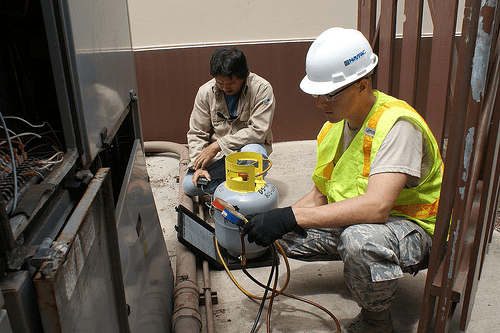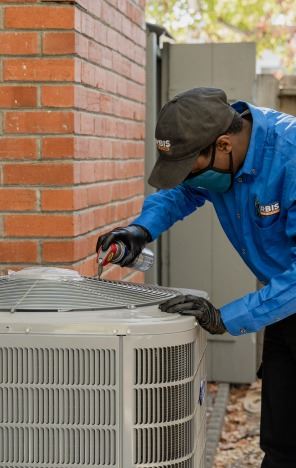Seasonal Reasons for heat pump installation ooltewah tn
Seasonal Reasons for heat pump installation ooltewah tn
Blog Article
Exactly How a Warmth Pump and Furnace Work Together to Optimize Your Home's Heating Performance
Recognizing just how a heat pump and furnace interact is necessary for homeowners seeking efficient home heating solutions. Each system has its strengths, giving a well balanced method to home comfort. The heatpump masters moderate temperature levels, while the heating system provides rapid warmth during severe cold. This harmony not just decreases energy prices yet additionally improves the life-span of both devices. What aspects influence this collaboration, and how can homeowners optimize their advantages?
Comprehending Warmth Pumps: Just How They Work
Although many individuals might be not familiar with their internal operations, heatpump play a vital role in modern heating unit. These tools run by transferring heat from one location to one more, utilizing the principles of thermodynamics. In chillier months, a heat pump removes warm from the outdoors air, ground, or water, and transfers it indoors to warm up the home. On the other hand, throughout warmer months, it can reverse the procedure, serving as an ac unit by getting rid of heat from inside to the outside.Heat pumps include an evaporator, condenser, development, and compressor shutoff. The cooling agent within the system takes in heat as it evaporates at low temperature levels and stress. The compressor after that enhances the pressure and temperature level of the refrigerant, enabling it to launch warm as it condenses. This efficient process can substantially reduce energy usage contrasted to conventional heating techniques, making heat pumps a sustainable choice for climate control in homes.
The Function of Heaters in Home Home Heating
Heaters play a crucial function in home heating by supplying a reliable resource of warmth during the colder months. They operate by producing warm through burning or electric resistance, distributing it throughout the home through air ducts or glowing systems. The performance of a heater is typically gauged by its Yearly Fuel Use Performance (AFUE) ranking, which shows just how efficiently the system converts fuel into heat.Furnaces can utilize different energy resources, consisting of natural gas, electrical energy, lp, or oil, permitting home owners to select the most ideal alternative for their requirements. Unlike heat pumps, which may battle in extreme cool, heating systems preserve consistent efficiency, making sure that indoor temperatures stay comfortable regardless of outdoor problems. Additionally, contemporary furnaces often come furnished with innovative technology, such as clever thermostats and variable-speed blowers, boosting their efficiency and responsiveness. This adaptability makes heaters a critical component in all-inclusive home heating methods.

Benefits of Utilizing Both Solutions With Each Other
Integrating the toughness of both furnaces and heatpump can result in an extra effective and effective home heating option. Using both systems allows property owners to capitalize on the heat pump's energy performance during milder temperature levels while depending on the heater for even more extreme cold conditions. This double strategy can considerably decrease energy expenses, as heat pumps eat much less electrical power than traditional heating techniques when temperature levels are moderate.Additionally, utilizing both systems together can enhance comfort degrees in the home. Warmth pumps can supply regular, also heating, while heating systems can quickly raise ambient temperature levels when required. Additionally, the assimilation of both systems can prolong the life expectancy of devices by minimizing deterioration on each device, as they share the work. Eventually, homeowners can delight in a balanced, cost-effective home heating option that changes effortlessly to differing weather conditions, guaranteeing a cozy and inviting home throughout the winter season.
How Warmth Pumps and Furnaces Enhance Each Various Other
They create a corresponding heating system that takes full advantage of efficiency and comfort when homeowners integrate warmth pumps and furnaces. Heat pumps run by moving warm from the outside air or ground, making them very effective in modest environments. They succeed during milder temperature levels, supplying economical home heating. Alternatively, furnaces generate warm through combustion or electric resistance, delivering strong, prompt heat during severe cold conditions.The mix of these two systems enables dynamic changes based upon temperature level fluctuations. Throughout warmer months or milder winter days, the heatpump can take the lead, saving power and reducing costs. As temperature levels decrease, the heater can flawlessly involve, guaranteeing constant heat throughout the home. This harmony not only maximizes power use but likewise improves the life-span of both systems, as each system runs within its ideal performance array. Together, they create a balanced atmosphere that adapts to differing environment demands.
Maximizing Efficiency: Tips for Homeowners
Property owners can improve their heating efficiency with a number of functional strategies. Establishing a regular maintenance routine, incorporating clever thermostat modern technology, and implementing effective insulation and sealing services are key steps. These procedures not only enhance convenience yet additionally lower energy expenses.
Regular Upkeep Arrange
To assure maximum heating effectiveness, establishing a routine maintenance schedule is vital for any type of home. Homeowners ought to prioritize regular examinations of both heat pumps and heating systems to determine peak efficiency. This consists of transforming air filters each to three months, as clogged up filters can greatly lower performance. Furthermore, organizing expert upkeep a minimum of annually permits professionals to recognize and resolve potential concerns before they intensify. Property owners should additionally clean up the heatpump's outdoor device to avoid particles build-up that can impede air movement. By adhering to a regular maintenance timetable, property owners not just boost their heating unit' performance but also expand their lifespan, bring about better convenience and minimized energy expenses throughout the chillier months.
Smart Thermostat Assimilation
Integrating a wise thermostat into a home heating unit can greatly improve energy effectiveness, particularly as it permits specific control over temperature settings. These tools can find out the home owner's timetable and preferences, immediately changing the temperature to optimize convenience while decreasing power use. As an example, they can decrease heating throughout times when the home is unoccupied, minimizing unnecessary consumption. Lots of wise thermostats also supply real-time energy usage information, making it possible for property owners to make educated decisions concerning their home heating behaviors. In addition, remote gain access to via smartphone apps enables users to readjust settings from anywhere, making certain the home is warm upon return. Overall, smart thermostat integration not just improves visit this site convenience yet significantly contributes to power cost savings and effectiveness.
Insulation and Securing Solutions
Smart thermostats play a critical role in energy efficiency, however their performance can be significantly boosted by proper insulation and sealing remedies. House owners ought to focus on shielding wall surfaces, attics, and floors to decrease warmth loss. Premium insulation products, such as spray foam or fiberglass, can significantly boost thermal resistance. Additionally, sealing spaces around windows, ducts, and doors avoids chilly air infiltration and warm getaway. Weatherstripping and caulking are reliable techniques for addressing these leakages - heat pump installation ooltewah tn. Regular examinations for air leakages, in addition to the use of blower door examinations, can assist identify problem areas. By spending in insulation and sealing, homeowners can enhance explanation the performance of their heating unit, ultimately bring about lowered power usage and reduced energy expenses
Typical Misconceptions Regarding Warm Pumps and Furnaces
What mistaken beliefs border warmth pumps and heating systems? Many people wrongly believe that heat pumps are ineffective in chillier climates. In truth, modern-day heatpump are designed to run efficiently even in low temperatures, giving reliable home heating throughout winter. An additional typical misconception is that heaters are always much more efficient than heatpump. This depends on the specific power sources and effectiveness scores of the systems in inquiry. Some may also assume that utilizing both systems simultaneously is unneeded, yet actually, this mix can enhance home heating effectiveness, specifically throughout extreme climate condition. Additionally, individuals typically presume that heatpump need constant upkeep, when actually, they have comparable upkeep requires to conventional heater. By debunking these myths, house owners can make more educated choices regarding their home heating alternatives, ultimately causing improved convenience and power performance in their homes.
Maintenance Factors To Consider for Combined Systems

Regularly Asked Inquiries
Can Warm Pumps Job Properly in Incredibly Cold Climates?
Heatpump can struggle in extremely chilly environments due to minimized effectiveness and heat extraction limitations. Developments in technology have led to designs developed for far better performance in such problems, boosting their feasibility in harsh settings.
How Much Time Do Warmth Pumps and Furnaces Usually Last?
Heat pumps normally last 15 to two decades, while heaters have a life-span of 15 to thirty years. Normal upkeep can extend their durability, making certain reliable operation and lowering the need for early replacements.

What Is the Average Price of Setting Up Both Systems?
The ordinary price of setting up both a heatpump and a heating system generally ranges between $5,000 to $10,000 - heat pump service. Variables influencing this price include system dimension, installment complexity, and regional labor prices
Exist Tax Motivations for Using Energy-Efficient Home Heating Equipments?
Numerous homeowners ask concerning tax incentives for energy-efficient home heating systems. Various federal and state programs usually offer discounts or credit histories, urging the adoption of sustainable innovations to lower power intake and promote environmental obligation.
Exactly how Do I Pick the Right Dimension Heat Pump and Furnace?
Choosing the best dimension heatpump and heating system entails calculating the home's square video footage, taking into consideration insulation top quality, and evaluating neighborhood environment. Consulting a professional can guarantee perfect system performance and power effectiveness based on particular needs. furnace replacement. Recognizing just how a warmth pump and heating system work together is important for home owners seeking efficient home heating remedies. In chillier months, a heat pump extracts heat from the outdoors air, ground, or water, and transfers it inside your home to warm the living space. When homeowners incorporate warm pumps and furnaces, they create a complementary home heating system that maximizes performance and comfort. Heat pumps run by transferring warmth from the outdoors air or ground, making them extremely reliable in moderate environments. Warm pumps can struggle in exceptionally chilly climates due to minimized efficiency and heat removal limitations
Report this page